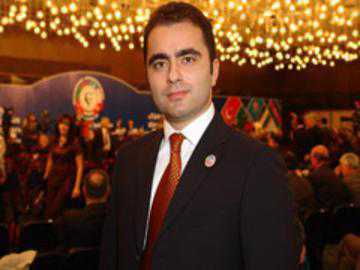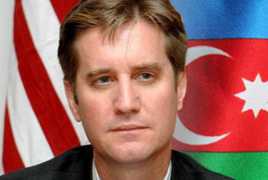Cengiz Aktar is incorrect and misleading on numerous points in his article (“Turkey’s Armenian policy subcontracted to Azerbaijan?” Today’s Zaman, Tuesday, March 8, 2012, p. 15).

Usage of selective facts and memories, coupled with poor knowledge of world’s history, and a liberal agenda that opposes anything remotely “nationalistic” and favors kissing up to traditionally unfriendly nations, are probably to blame for Dr. Aktar’s stance (which contravenes the position of majority of Turks, according to all polls). On a more personal level, Dr. Aktar of course blames Azerbaijan, and its people, as well as all Turkish “nationalists” – who are, apparently, some 70% of the entire nation – for the flop of his insensitive, to put it mildly, campaign “Ozur diliyoruz” in 2008.
Although Dr. Aktar claims Turkey has “never” been an important player in the Caucasus, the fact is that Turkey has always been an important player and regional actor in the Caucasus – this was especially true in the Ottoman times, when it controlled large swath of Caucasus, including Azerbaijan, for decades, in 16th and 18th centuries (and conducted important census survey’s of the population in, among other regions, Karabakh – where Armenians were in minority then and until the 20th century). It remained true in the turbulent era of the beginning of the 20th century, including during the “Great Catastrophe” times he mentions, that befell on all the people of Anatolia and (!) Caucasus – after all, according to Ottoman archives, 523,000 Turks and Kurds of Anatolia died in the hands of Armenians in the years 1914-1920. Approximately the same number of Azerbaijani Turks, Kurds, and others died in the hands of Armenians in the same period of time in the Caucasus. It continued under Ataturk and Lenin, since in 1921, two important treaties were signed, Moscow and Kars, that regulate the status of Naxcivan region of Azerbaijan, as well as other parts of Caucasus (e.g., Batumi, Ajaria).
Indeed, Naxcivan region has always been extremely close, especially spiritually, to Turkey, and would probably appeal far more to a typical Turk than some of the regions inside Turkey itself. To be sure, the few surviving 100 year old elders in Naxcivan still remember the day, hour and even minute of when Gen. Kazim Karabekir Pasha’s army entered the region and saved the Azerbaijani Turks, as well as a Kurdish minority, from total annihilation by the French-, British-, and Russian-armed Armenian army, commanded by war criminals such as Andronik Ozanyan and future Nazi SS general Dro (Drastamat Kanayan), who are still considered “heroes” in modern Armenia and its diaspora (and they do not even think about an apology to Turks, Azeris, Kurds, or Jews).
Turkey joined NATO in 1952 – a seminal event in the history of that alliance and in the history of Turkey – after Stalin, per advice from his Armenian comrade Anastas Mikoyan, demanded Kars, Ardahan and other territories in Eastern Turkey which are geographically in the Caucasus region, not Anatolia (yes, let us explain for the geography-challenged – it means Turkey is still geographically part of Caucasus even today). If Turks thought that would be the end of it, they were reminded again on 23 August 1990 by the Armenian declaration of independence, which concludes its claims on a major chord (official translation into English by the Armenian government): “Article 11. The Republic of Armenia stands in support of the task of achieving international recognition of the 1915 Genocide in Ottoman Turkey and Western Armenia” (i.e., refers to Eastern Turkey as “Western Armenia”).
So this is how an independent Armenia began its life – with declaration that anti-Turkish resolutions and activities are its state policy and government objective. Needless to say, this did not bode well with the Turkish people, who have been demanding that Armenian government changes its stance. And this is what led to the “brave”, as Dr. Aktar refers to them, Zurich Protocols to sink. Brave were the Turkish people who overwhelmingly protested this, not the politicians or liberal journalists singing praise to such undemocratic, illogical, and immoral actions as ignoring the will of the majority of Turkish citizens, overlooking Armenian state claims and diaspora actions, and pretending that actions like the Khojaly Massacre or Karabakh and Kelbajar occupation, all committed by the Armenian government officials now in power, are not directly inter-linked.
The fact is that Turkey remains a very important player in the Caucasus, and thanks to its strategic partnership and alliance with Azerbaijan, its role not just in the Caucasus, but the Greater Middle East, and the world, has increased significantly. Turkey would have a hard time to compete with Saudi Arabia for the leadership in the Arab world, not to mention competition from Iran for the hearts and minds of the Arab and Iranic worlds. Nor can it compete with the EU for the hearts and minds of Balkans, after they will be fully absorbed into the Union.
But in the Turkic world, Turkey has a natural leadership position. Azerbaijan and Kazakhstan are among top investors into Turkey, while Azerbaijanis from various countries, including from Russia, have been top individual investors for the past decade. Turkey’s status as an energy hub is, without any shadow of doubt, due to the BTC and BTE pipelines, which were paid for mostly by Azerbaijan and carries Azerbaijani oil and gas. Have any other nation(s) done anything as important geo-strategically and geo-economically? No. These foreign direct investments are made into Turkey in large part due to ethnic, linguistic, cultural and historic affinity Turkic nations share – even though investments into China, India, Brazil, Indonesia, or some other nations might be more profitable.
Furthermore, it is to check against Turkey in the Caucasus that Russia maintains the large Gymri army base in Armenia, and Russia’s ultra-nationalist (or some say, fascist) political leaders such as Vice-Speaker of the Duma and relentless presidential contender Vladimir Zhirinovsky constantly calls for (including numerous times this February 2012 as a candidate for President of the Russian Federation).
While Dr. Aktar might have difficulties in talking with representatives of other Turkic nations, many Turks do not, and certainly, many Turkic people, from as far away as Yakutia in Russia, not to mention Azerbaijanis, Turkmens, Uzbeks or Gagauz, have no problem in basic verbal communication skills while in Turkey. Considering the staggering geographic distances and millenniums of living apart, this is incredible – Russians cannot understand Polish people or Ukrainians whom they border, while British, Irish, Scots and Americans have sometimes trouble understanding each others’ accents, as do Arabs in countries like, say, Algeria and Lebanon. Meanwhile Chinese and Indians have multiple mutually non-intelligible languages within their countries, such as Mandarin and Cantonese, Hindi, Urdu and Bengali (a total of 22 official languages in India alone).
And of course, Armenians that Dr. Aktar lobbies hard for speak Western Armenian and Eastern Armenian – and have extreme difficulty understanding each other despite being supposedly the same people (actually genetic research shows variation within Armenians from different regions). However, Turks speaking to Azerbaijanis or Turkmen would experience very little difficulty (especially if those Turks are from Eastern Turkey), since up to 80% of the language is still the same, despite centuries and thousands of kilometers of living apart in different socio-political environments.
Thus, linguistic commonality with other Turkic nations is very much present, and has helped Turkey tremendously, especially to Turkish business community expanding into Turkic countries (and dominating many spheres, such as construction). It also helps to know the Turkic world better, or to re-discover it. Dr. Aktar should try that, and not refer to his experiences in the early 1990s as some permanent benchmark.
It should be noted that the DNA tests and other “gene-mapping” that Dr. Aktar refers to, are interpreted very selectively. For example, an authoritative study shows that some 11% of all men in central Eurasia (and 1 in 200 men worldwide) carry the gene of the great Cengiz Khan – and not the gene of, for example, Armenian vassal king Ara the Beautiful. All genetic studies confirm that Anatolian Turks have a double-digit genetic similarity with Turks of Central Asia, and an extremely close genetic similarity with Azerbaijani Turks.
In fact, in a major study by the National Academy of Sciences of the United States of America in 2001, that involved scientists from U.S., UK, Russia, Armenia, Iran, India, Tajikistan, Uzbekistan, Kyrgyzstan, Turkmenistan, and Georgia (but not Azerbaijan or Turkey), found that based on Y-chromosome biallelic haplotype frequencies, Turks are closest to Azeri and Kazbegi (Georgian) people, sharing number #627, followed by Iranians (#625) and others in the same green Cluster 2. In the same study, Armenians were placed in a different blue Cluster 1, and only had a number #612 – right next to Turkmens. Thus, genetic studies can prove many different things – but only authoritative and comprehensive studies should be trusted, not the highly selective sponsored-research that Dr. Aktar is most likely referring to.
Finally, the disparaging tone and manner in which Dr. Aktar refers to 300,000 diverse residents of Istanbul who took to the Taksim square to commemorate the Khojaly Massacre – a war crime and genocidal act that is being increasingly recognized, including in several U.S. states, as well as in nations spanning from Mexico to Pakistan – is in stark contrast with his tone towards the 10,000 to 100,000 that took to the same Taksim square as part of his pet project of apologizing for everything and anything that Turkey as a state, and Turks as citizens of that state, are not guilty of. Dr. Aktar should tone down his extreme Armenophile position, his latent Turcophobia and not-so-covert anti-Azerbaijanism – and that should be the roadmap for the few unnamed “Turkish columnists” that he refers to in his article.
Adil Baguirov, Ph.D.
Co-founder, U.S. Turkic Network (USTN)




